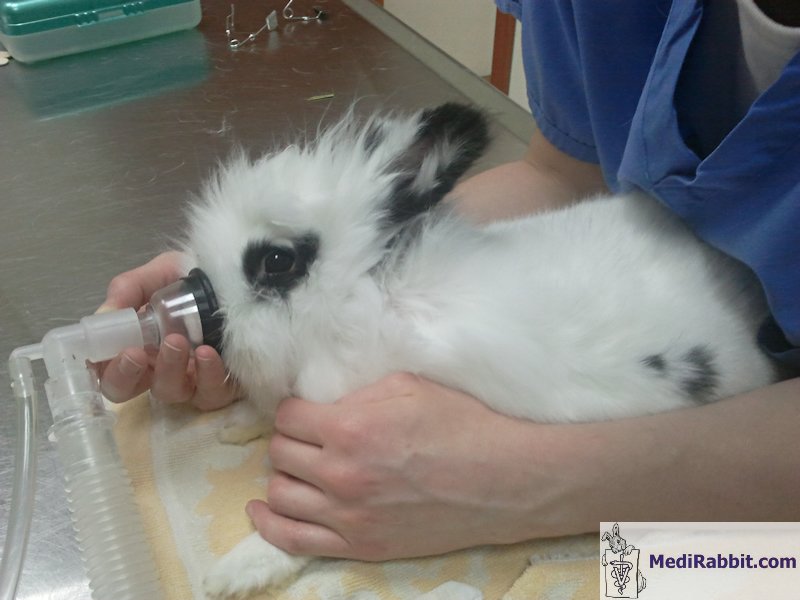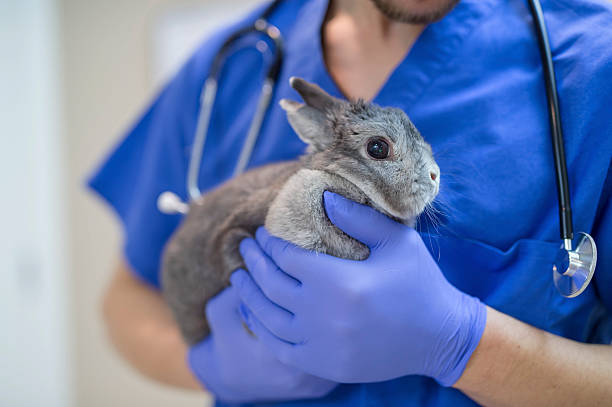Neutering a rabbit and its benefits
Neutering a bunny benefits their overall health and can make your life as a bunny owner easier. Neutering stands for the process of having an animal undergo surgery to remove its reproductive organ. For female animals, neutering (also known as spaying) removes their uterus and ovaries, and for males, their testicles. This will make the animal infertile which is good for population control.
Since neutering makes your rabbit undergo surgery, we understand how traumatizing it can be to even imagine it! As bunny owners ourselves, it took us a bit of courage to neuter our rabbits as the thought of losing our rabbit through something that is out of our control is very devastating. In the end, we gritted our teeth and went with it as we know the benefit of neutering a rabbit outweighs the cons.
In this post, we will discuss why you should neuter your rabbit as well as the benefits of doing so. If you would like to know the whole procedure on how neutering a rabbit is done (GRAPHIC!), you can view it here!
Should you neuter your rabbit?
The short answer is yes. Neutering your rabbit comes with many health and behavioral benefits. One of the biggest benefits is that neutering your bunny can help prolong their life. Neutering a rabbit comes with risks but the benefits outweigh the risks in the long run.
When do rabbits reach maturity?
Rabbits can reach their sexual maturity as young as 4 months old for both male and female rabbits. However, most of the time females will reach sexual maturity at around 5 months, 4 being exceptional for small-sized rabbit breeds.
Finding out when your bunny reaches sexual maturity can be tricky. We will list down some characteristics that you can look out for when determining if your bunny has reached maturity. These characteristics can both be physical and behavioral.
How to tell if a male rabbit has reach maturity
- Testicles descended
- Humping objects or you
- Spraying urine at random areas
- Increased aggression (growling and nipping)
- Circling you and soft honking
How to tell if a female rabbit has reached maturity
- Humping (yes, female rabbit does this too)
- Increased territorial behavior (lunging at you when you try to touch her at her spot)
- Spraying urine to mark
- Circling you with soft honking
- Chewing and digging a lot
- Plucking their fur out a lot (false pregnancy)
- Swollen vulva at her private part (hard to see and requires you to lift your bunny)
If your young bunny is exhibiting these actions, they are becoming sexually mature. Rabbits can go through the neutering process when they are sexually mature. Although smaller rabbit breeds like the Netherland Dwarf can reach maturity as young as 3 months old, we do not recommend for you to undergo the surgery. Undergoing surgery for a young rabbit can be risky! It is recommended to have a veterinarian check your rabbits before making a decision. Once you have gotten the green light from your veterinary, you can start preparing your bunny for the surgery with pre-operative care.
Is it dangerous to neuter a rabbit?
Now it will be a lie if a surgery claims to be 100% safe and risk-free. Every surgery comes with a risk. Rabbit neutering is only dangerous if the veterinarian you have chosen is not used to handling small animals. An experienced veterinarian will evaluate your rabbit before surgery to check if your bunny is sexually mature and is healthy enough to perform the surgery.
Sometimes your bunny may not be fit for surgery due to health issues. For example, a rescue rabbit may not be at its best health if it has not been eating well based on a proper diet or proper food. Many rescue rabbits are neglected by their previous owner so please do your part in ensuring the rabbit is fit for surgery! The last thing that you want is to have your rabbit pass away from complications!
How old is too old?
Truth to be told, middle aged rabbit (5-6 years old) and older face far greater risk in the surgery. As your rabbit gets older, the risk involved in neutering/spaying is definitely higher. Like human, the older the age the higher the chance of complications.
Although the risks are higher, many veterinarians do agree that the benefits of neutering/spaying far outweighs the risks. If you plan on sterilizing older rabbits, you should have a serious discussion with your chosen veterinary before the surgery.
If budget is not an issue, it is also a good idea to have your rabbit to undergo a thorough health check before neutering/spaying. This helps in detecting underlying illness that may make the surgery more risky. This kind of check up may cost more than the surgery itself.
Common issues faced when neutering a rabbit
1. Anesthetic complication during surgery

[[## figcaption="Photo by Amir Maurer from MediRabbit"##]]
This is by far the most common complication when neutering a rabbit. The anesthetic complication occurs at the rate of 0.7% for healthy rabbits. Rabbits usually don’t survive if an anesthetic complication happens. But nowadays it is as relatively safe as procedures and drugs are constantly updated.
Solution – Always do your due diligence on your chosen veterinary. Ensuring that the veterinarian you have chosen specializes in performing surgery on rabbits or small animals greatly reduces the risk of an anesthetic complication. Smaller animals require a different dosage of anesthetic and simple miscalculation can be fatal.
Sometimes wild card scenarios may happen but this is rare. Some wild card scenario includes your bunny being allergic to the anesthetic or medicine given and also your bunny having some underlying health issues that could not be detected.
Always ask questions to better understand whether the veterinarian is suitable.
2. Wound infection after neutering
Infections usually happen when post-operation care is not done well. Infections usually occur when your rabbit licks the operated area excessively or is placed in unsanitary and unhygienic quarters (damp/moist/dirty).
Solution – Having your rabbit wear a cone helps with licking. However, that is just half of the battle as the cleanliness of your rabbit’s area is the most important one. To avoid infection on the wound, you need to keep your bunny’s area as clean as possible. The living area should be dry and free from harmful bacteria. Try to avoid having your bunny’s urine pool around the area.

[[## figcaption="My rabbit wearing a plastic cone to prevent her from licking her stitches"##]]
Benefits of neutering male rabbits
- Reduced risk of testicular cancer – Neutering a male rabbit can greatly reduce the risk of testicular cancer. Similar to female rabbits, the male rabbit can also develop disease and cancer in their reproductive organ.
- Population control – Population control of rabbits is very important as they can breed like crazy in a short period. Male rabbits are known to mount anything they can get their hands on. If you keep female rabbits as pets with your male rabbits, neutering them ensures that you don’t end up with a dozen of rabbits!
- Less roaming and fighting – Male rabbits tend to roam to look for a mate and fight with other rabbits to assert their dominance. Fighting amongst rabbits can be brutal as bleeding and infection can happen from their little scuffle. If you keep multiple male rabbits as pets, neutering them can ensure that they won’t kill each other.
- Potty trainable – Similar to female rabbits, neutering a male rabbit helps with potty training. Male rabbit marks territory more frequently compared to female rabbits. This can be a problem as male rabbits’ urine have a stronger smell and this can stink up the compound.
- Bonding – It is almost impossible for an unneutered male rabbit to bond with other rabbits. Male rabbits’ testosterone causes them to be aggressive towards other rabbits. Even if you managed to bond an unneutered male rabbit with other rabbits, it is not safe for the other rabbits. Neutering a male rabbit helps as their testosterone level will decrease upon castrating their reproductive organ.
Benefits of neutering female rabbits
- Minimize risk of cancer and disease – Female rabbits have an 80% chance of developing reproductive cancer after the age of 2. Most of the time, cancer develops in a female rabbit’s uterine. Neutering your rabbit can greatly reduce the chance of cancer developing in their reproductive organ as it involves removing the female rabbit’s reproductive organs like their uterine and ovary.
- No false pregnancies – False pregnancies often occur when a female rabbit is not neutered. This behavior can be troublesome as they will show aggressive behaviors. During their false pregnancy episode, they tend to be very aggressive towards everything (rabbits and humans) as they want to protect their nest.
- Population control – Upon neutering, your bunny will be infertile as neutering removes your bunny’s reproductive organ. This is extremely useful if you have rabbits of different sexes as pets. Rabbits can breed a lot in a short period. If you are not ready to take care of dozens of rabbits at the same time, it is better to have them neutered!
- Bonding – Bonding will be easier after neutering as your bunny will lose its innate territorial nature. If you have rabbits of different sexes, it is almost impossible to bond them if they are not neutered. Rabbits that are neutered will be less aggressive and more relaxed. This calmness helps a lot in bonding.
- Easier to potty train – Upon neutering, potty training your bunny is significantly easier. Rabbits’ territorial nature causes them to have a high tendency to mark territory with their urine. This behavior can cause potty training to be difficult. A male rabbit that is neutered will show less of its territorial behavior.
- Less aggressive– Sterilized rabbits are more calm and relaxed. Aggressive rabbits can be a problem if you have young children at home as they often lunge or bite whenever you come too close to their territory.
How to choose the right veterinary for your rabbit
When it comes to choosing a veterinarian that is trustworthy and reliable, we advise you to filter them with questions. These questions are helpful as it gives you an insight into how the veterinary work with animals and whether they are experienced with small animals.
Do note that this is how we find our veterinarian for our rabbits. It should not be the benchmark or deciding factor for your choice in choosing your veterinary. It can help gauge the familiarity of the veterinary with rabbits which minimizes the risk of the surgery!
The statistics and numbers stated may vary from country to country. We are writing this as a rabbit owner in Malaysia where having a rabbit as a pet is uncommon.

[[## figcaption="Photo by FatCamera from iStock"##]]
1. How often do you treat rabbits?
When choosing a veterinary, it is best to know if other rabbit owners are going to them. This helps you determine whether the veterinarian you are choosing is experienced in dealing with rabbits. If other rabbit owners trust them, it is often a good sign unless they are the only veterinarian available in the rea. Generally, a veterinarian that treats 10 rabbits or more in a month is a good sign.
2. How often do you neuter rabbits?
The neutering procedure varies from animal to animal. You need to find out whether they are familiar with neutering a smaller animal. Rabbits are by far one of the smallest animals that can be neutered thus, familiarity with the procedure is very important. Ideally, the veterinarian is neutering around 1 – 5 rabbits a month.
3. Are there any cases of failed surgery due to anesthesia with rabbits before?
This is quite a sensitive question but a trustable veterinarian should be honest with you upfront and let you know the percentage of failure when asked. You can find out whether the veterinarian is familiar with small animals and their required dosage of anesthesia for surgery. Some surgery may be more complicated than neutering but when it comes to neutering, it should be less than 0.1% or less due to anesthesia.
4. Will antibiotics be given after surgery?
Antibiotics are generally not needed for post-surgery recovery. Post-surgery recovery usually depends highly on how the rabbit owners treat and care for their bunny post-surgery. Your veterinarian may provide antibiotics to prevent infections from happening. Be sure to find out what antibiotics your veterinarian is providing as some of them are not suitable for rabbits!
There are many other questions you can ask your veterinary, especially those more in-depth and technical ones. Generally, these 4 questions are enough to find out whether the veterinarian you have chosen is experienced with rabbits.

